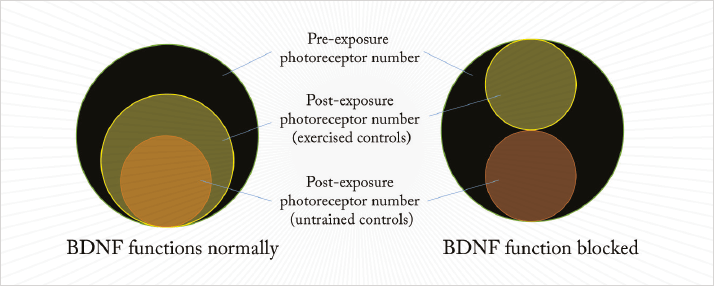
The usual reasons for going to the gym are to lose weight, keep fit, look younger and live longer; increasing your level of brain-derived neurotrophic factor (BDNF) doesn’t figure. But in binding to its receptor, which is called TrkB, BDNF helps existing neurons to survive and encourages the growth and differentiation of new ones (it promotes muscle growth and repair too).
It is hard to determine where BDNF is being expressed and by how much in humans after exercise, so most studies have been performed in mice and rats. It’s long been known that exercise increases BDNF levels in rat brains, particularly in the hippocampus (1). What’s new today is the finding in mice that moderate aerobic exercise helps to preserve the structure and function of nerve cells in the retina after damage (2). A group of researchers from the Atlanta VA Center for Visual and Neurocognitive Rehabilitation and Emory University demonstrated this by having mice run on a treadmill at a speed of ten meters per minute for one hour, five days a week for two weeks before exposing both exercised and inactive mice to toxic bright light (10,000 lux for four hours). This resulted in a 75 percent loss of both retinal function and the number of photoreceptor cells in the inactive mice. However, the active, exercised mice exposed to bright light had twice the retinal function and twice the number of photoreceptor cells than their inactive littermates (Figure 1).
The protective effect was mediated by BDNF. Exercise caused retinal BDNF protein levels to increase by 20 percent compared with inactive mice. Repeating the experiment, but this time administering systemic injections of a TrkB receptor antagonist to the mice, reinforced this observation. When the effects of BDNF were blocked in this way, toxic light exposure affected retinal function and photoreceptor counts equally in active and inactive mice – the protective effects of exercise were gone (Figure 1).
What does this mean for humans? Developed nations have a rapidly aging demographic, and age-related macular degeneration (AMD) is one of the leading causes of blindness in the elderly. Exercise may mitigate or delay the effects of the AMD disease process. “This is the first report of simple exercise having a direct effect on retinal health and vision,” says Emory’s Machelle Pardue. “This research may one day lead to tailored exercise regimens or combination therapies in treatments of blinding diseases.” Michelle Ploughman, a neuroscientist based at Memorial University of Newfoundland, Canada explained that, “These findings further our current understanding of the neuroprotective effects of aerobic exercise and the role of BDNF. People who are at risk of macular degeneration or have early signs of the disease may be able to slow down the progression of visual impairment.”
References
- N.C. Berthold et al., “Exercise primes a molecular memory for brain-derived neurotrophic factor protein induction in the rat hippocampus”, Neuroscience, 133, 853-861 (2005). E.C. Lawson et al., “Aerobic exercise protects retinal function and structure from light-induced retinal degeneration”, J. Neurosci., 34, 2406-2412 (2014).
